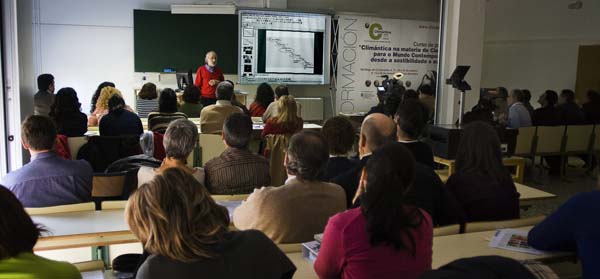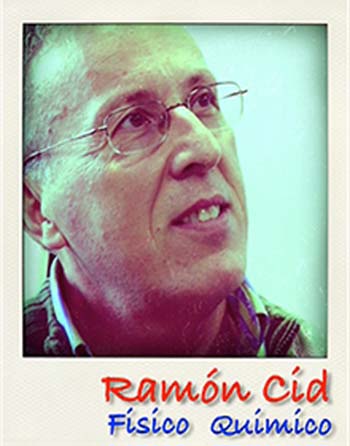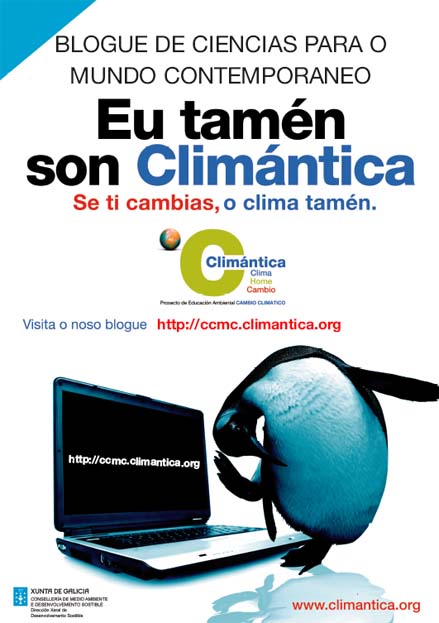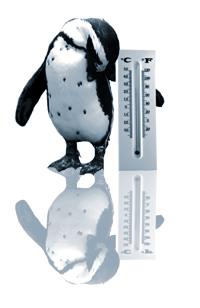
The second documentary, that covers the lecture given by Dr. Francisco Anguita in the framework of the course given on 15 November 2008 on Climantica in the subject of Science for the Contemporary World from the point of view of sustainability and IT, contains the main environmental issues.
He starts by stating that oil will doubtless disappear in this century, probably not further than 2030-2040.
Then he talked about the increase of geological risks linked to overpopulation and associated with urban planning and territorial problems. He mentions the risk of North Teide’s landslide as an example of how economy intensifies natural risks.
Concerning the Earth’s overpopulation and the opposition Economy vs. Ecology, he opened the ethical debate on the possibility that some regulations should be established in order to bring the planet’s population under control.
In addition, he tackled the issue of ice melting emphasizing that Greenland’s ice sheet has experienced record ice melting during the summer of 2007, increasing the rate about 30% from 2006. The most outstanding example is the threat to the polar bear because of melting ice. According to him, this is again an example of how economy is confronted to ecology since at present it is perceived that the only emergency now is the recovery of economy and therefore, any other priority should wait, mainly those which are likely to create a shift of public opinion and therefore can slow down such recovery.
Another environmental concern is focused on the question that whether the present civilization will be able to stand a Cretaceous climate. If global temperature increases by 0,7ºC during the 20th century, over the next century it will rise at least three times as that. Temperature will probably rise by 3ºC to 6ºC during this century. This temperature scenario is similar to that existing in the Cretaceous period, when such temperature could allow people to swim in the Arctic. This is not possible for the biosphere at present, since the species are not adapted.
Then he pointed out the issue of sea level rising which is clearly connected to a possible
recurrence of the Cretaceous climate. He provided real data on temperature rise in 7ºC in the Mediterranean in only 18 days, and explained that a rise of 3º C in the temperature of the Mediterranean Sea could imply a risk of hurricanes due to the increase in convection linked to that temperature rise.
Taking this scenario into account, he criticized the concept of ‘Sustainable Development’ because from his point o view, it allows human beings to destroy the planet without feeling guilty. He argued that although this concept was born in the 80s, the present development is growing more and more unsustainable. In this sense, he compares the way of life led by someone who tries to protect the Planet with that of someone who intends to bring a better quality of life by using more resources. Instead, he opts for the idea of having a better quality of life by minimising the use of natural resources.
As a way out to the Planet’s crisis he mentions the possibility of life in Mars. He refers to the difficulty to industrialize that planet in order to generate a greenhouse effect that is capable of regulating the temperature so that plants can grow. In this way Mars could be inhabited, but he wonders if this could be licit or even appropriate at this stage. On the other hand, the Earth is gaining 200 000 new inhabitants a day and this involves the need to move one million people in five days so that the possibility for those people to go away is not fulfilled.
Another ethical debate was based on the fact that the Homo sapiens as the last species to inhabit the Earth has the right to make other species disappear. In answer to this, he came to the conclusion that we are responsible for the protection of our planet, and this is not only a claim from the ecologist movement because our consumption of natural resources is over what the ecological footprint can support. Taking this principle into account, he argues that the teachers’ role does not consist of making students distressed but establishing educational contexts that raise awareness.
Another interesting topic he tackled was food. He explained that it is possible that the food we eat every day has travelled about 133 000 km by plane or ship, that is, it could have travelled around the world before we buy it. He criticized the fact that this sort of trade helps the Third World’s economy but it causes the greenhouse effect, emphasizing again the opposition Economy vs. Ecology.
Summarizing all the above-mentioned approaches to this confrontation, he pointed out that there was the risk that the IPCC’s work was pushed back to the background by the economic crisis. Nowadays, the IPCC is the body that has made the most sensible and comprehensive scientific effort in view of the fact that whenever their proposals are objected for political reasons, they refuse these objections if there is not a sound evidence of them. This proves that the 2007 IPCC report is rigorous, comprehensive and it results from an agreement of all the parts. Therefore, Mr. Anguita wonders whether it is possible that climate change becomes natural following the conclusions of 2007 IPCC. According to him, the debate is now focused on what we should do to settle the problem but also considering the difficulty involved in the fact that we are the only species that does not work in cooperation with each other, and that it is the citizens, not the Earth, who vote for the politicians on the grounds of the economic situation. Finally, he pointed out that up to the present, human beings solved their problems thanks to technology, but this problem is so serious that, for the first time, technology could not be enough to solve climate change.






